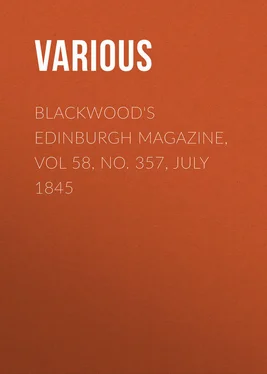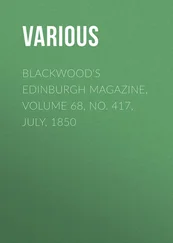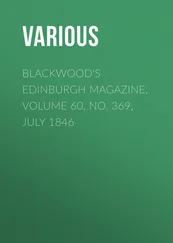Various - Blackwood's Edinburgh Magazine, Vol 58, No. 357, July 1845
Здесь есть возможность читать онлайн «Various - Blackwood's Edinburgh Magazine, Vol 58, No. 357, July 1845» — ознакомительный отрывок электронной книги совершенно бесплатно, а после прочтения отрывка купить полную версию. В некоторых случаях можно слушать аудио, скачать через торрент в формате fb2 и присутствует краткое содержание. Издательство: Иностранный паблик, Жанр: periodic, foreign_edu, Путешествия и география, на английском языке. Описание произведения, (предисловие) а так же отзывы посетителей доступны на портале библиотеки ЛибКат.
- Название:Blackwood's Edinburgh Magazine, Vol 58, No. 357, July 1845
- Автор:
- Издательство:Иностранный паблик
- Жанр:
- Год:неизвестен
- ISBN:нет данных
- Рейтинг книги:3 / 5. Голосов: 1
-
Избранное:Добавить в избранное
- Отзывы:
-
Ваша оценка:
- 60
- 1
- 2
- 3
- 4
- 5
Blackwood's Edinburgh Magazine, Vol 58, No. 357, July 1845: краткое содержание, описание и аннотация
Предлагаем к чтению аннотацию, описание, краткое содержание или предисловие (зависит от того, что написал сам автор книги «Blackwood's Edinburgh Magazine, Vol 58, No. 357, July 1845»). Если вы не нашли необходимую информацию о книге — напишите в комментариях, мы постараемся отыскать её.
Blackwood's Edinburgh Magazine, Vol 58, No. 357, July 1845 — читать онлайн ознакомительный отрывок
Ниже представлен текст книги, разбитый по страницам. Система сохранения места последней прочитанной страницы, позволяет с удобством читать онлайн бесплатно книгу «Blackwood's Edinburgh Magazine, Vol 58, No. 357, July 1845», без необходимости каждый раз заново искать на чём Вы остановились. Поставьте закладку, и сможете в любой момент перейти на страницу, на которой закончили чтение.
Интервал:
Закладка:
The magnitude of the service rendered by Churchill to the Prince of Orange, immediately appeared in the commands conferred upon him. Hardly was he settled at William's headquarters when he was dispatched to London to assume the command of the Horse Guards; and, while there, he signed, on the 20th December 1688, the famous Act of Association in favour of the Prince of Orange. Shortly after, he was named lieutenant-general of the armies of William, and immediately made a new organization of the troops, under officers whom he could trust, which proved of the utmost service to William on the unstable throne on which he was soon after seated. He was present at most of the long and momentous debates which took place in the House of Peers on the question on whom the crown should be conferred, and at first is said to have inclined to a regency; but with a commendable delicacy he absented himself on the night of the decisive vote on the vacancy of the throne. He voted, however, on the 6th of February for the resolution which settled the crown on William and Mary; and he assisted at their coronation, under the title of Earl of Marlborough, to which he had shortly before been elevated by William. England having, on the accession of the new monarch, joined the continental league against France, Marlborough received the command of the British auxiliary force in the Netherlands, and by his courage and ability contributed in a remarkable manner to the victory of Walcourt. In 1690 he received orders to return from Flanders in order to assume a command in Ireland, then agitated by a general insurrection in favour of James; but, actuated by some remnant of attachment to his old benefactor, he eluded on various pretences complying with the order, till the battle of the Boyne had extinguished the hopes of the dethroned monarch, when he came over and made himself master of Cork and Kinsale. In 1691 he was sent again into Flanders, in order to act under the immediate orders of William, who was then, with heroic constancy, contending with the still superior forces of France; but hardly had he landed there when he was arrested, deprived of all his commands, and sent to the Tower of London, along with several of the noblemen of distinction in the British senate.
Upon this part of the history of Marlborough there hangs a veil of mystery, which all the papers brought to light in more recent times have not entirely removed. At the time, his disgrace was by many attributed to some cutting sarcasms in which he had indulged on the predilection of William for the continental troops, and especially the Dutch; by others, to intrigues conducted by Lady Marlborough and him, to obtain for the Princess Anne a larger pension than the king was disposed to allow her. But neither of these causes are sufficient to explain the fall and arrest of so eminent a man as Marlborough, and who had rendered such important services to the newly-established monarch. It would appear from what has transpired in later times, that a much more serious cause had produced the rupture between him and William. The charge brought against him at the time, but which was not prosecuted, as it was found to rest on false or insufficient evidence, was that of having, along with Lords Salisbury, Cornbury, the Bishop of Rochester, and Sir Basil Ferebrace, signed the scheme of an association for the restoration of James. Sir John Fenwick, who was executed for a treasonable correspondence with James II. shortly after Marlborough's arrest, declared in the course of his trial that he was privy to the design, had received the pardon of the exiled monarch, and had engaged to procure for him the adhesion of the army. The Papers, published in Coxe, rather corroborate the view that he was privy to it; and it is supported by those found at Rome in the possession of Cardinal York. 3 3 "During the interval between the liberation of Marlborough and the death of Queen Mary, we find him, in conjunction with Godolphin and many others, maintaining a clandestine intercourse with the exiled family. On the 2d May 1694, only a few days before he offered his services to King William, he communicated to James, through Colonel Sackville, intelligence of an expedition then fitting out, for the purpose of destroying the fleet in Brest harbour." – Coxe's Marlborough , i. 75. "Marlborough's conduct to the Stuarts," says Lord Mahon, "was a foul blot on his memory. To the last he persevered in those deplorable intrigues. In October 1713, he protested to a Jacobite agent he would rather have his hands cut off than do any thing to prejudice King James." – Mahon, i. 21-22.
That Marlborough, disgusted with the partiality of William for his Dutch troops, and irritated at the open severity of his Government, should have repented of his abandonment of his former sovereign and benefactor, is highly probable. But it can scarcely be taken as an apology for one act of treason, that he meditated the commission of another. It only shows how perilous, in public as in private life, is any deviation from the path of integrity, that it impelled such a man into so tortuous and disreputable a path.
Marlborough, however, was a man whose services were too valuable to the newly-established dynasty, for him to be permitted to remain long in disgrace. He was soon liberated, indeed, from the Tower, as no sufficient evidence of his alleged accession to the conspiracy had been obtained. Several years elapsed, however, before he emerged from the privacy into which he prudently retired on his liberation from confinement. Queen Mary having been carried off by the smallpox on the 17th of January 1696, Marlborough wisely abstained from even taking part in the debates which followed in Parliament, during which some of the malcontents dropped hints as to the propriety of conferring the crown on his immediate patroness, the Princess Anne. This prudent reserve, together with the absence of any decided proofs at the time of Marlborough's correspondence with James, seems to have at length weakened William's resentment, and by degrees he was taken back into favour. The peace of Ryswick, signed on the 20th of September 1697, having consolidated the power of that monarch, Marlborough was, on the 19th of June 1698, made preceptor of the young Duke of Gloucester, his nephew, son of the Princess Anne, and heir-presumptive to the throne; and this appointment, which at once restored his credit at court, was accompanied by the gracious expression – "My lord, make my nephew to resemble yourself, and he will be every thing which I can desire." On the same day he was re-appointed to his rank as a privy councillor, and took the oaths and his seat accordingly. So fully had he now regained the confidence of William, that he was three times named one of the nine lords justiciars to whom the administration of affairs in Great Britain was subsequently entrusted, during the temporary absence of William in Holland; and the War of the Succession having become certain in the year 1700, that monarch, who was preparing to take an active part in it, appointed Marlborough, on 1st June 1701, his ambassador-extraordinary at the Hague, and commander-in-chief of the Allied forces in Flanders. This double appointment in effect invested Marlborough with the entire direction of affairs civil and military, so far as England was concerned, on the Continent. William, who was highly indignant at the recognition of the Chevalier St George as King of England, on the death of his father James II., in September 1701, was preparing to prosecute the war with the vigour and perseverance which so eminently distinguished his character, when he was carried off by the effects of a fall from his horse, on the 19th March 1702. But that event made no alteration in the part which England took in the war which was commencing, and it augmented rather than diminished the influence which Marlborough had in its direction. The Princess Anne, with whom, both individually and through Lady Marlborough, he was so intimately connected, mounted the throne without opposition; and one of her first acts was to bestow on Marlborough the order of the Garter, confirm him in his former offices, and appoint him, in addition, her plenipotentiary at the Hague. War was declared on the 15th May 1702, and Marlborough immediately went over to the Netherlands to take the command of the Allied army, sixty thousand strong, then lying before Nimeguen, which was threatened by a superior force on the part of the French.
Читать дальшеИнтервал:
Закладка:
Похожие книги на «Blackwood's Edinburgh Magazine, Vol 58, No. 357, July 1845»
Представляем Вашему вниманию похожие книги на «Blackwood's Edinburgh Magazine, Vol 58, No. 357, July 1845» списком для выбора. Мы отобрали схожую по названию и смыслу литературу в надежде предоставить читателям больше вариантов отыскать новые, интересные, ещё непрочитанные произведения.
Обсуждение, отзывы о книге «Blackwood's Edinburgh Magazine, Vol 58, No. 357, July 1845» и просто собственные мнения читателей. Оставьте ваши комментарии, напишите, что Вы думаете о произведении, его смысле или главных героях. Укажите что конкретно понравилось, а что нет, и почему Вы так считаете.












